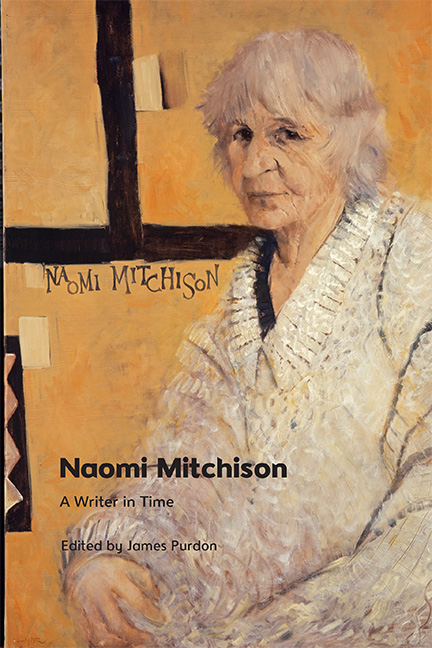Book contents
- Frontmatter
- Contents
- Acknowledgements
- Notes on Contributors
- Introduction
- 1 Naomi Mitchison’s Interwar Short Stories
- 2 ‘She had her hand on the plow’: Shame, Uncertainty and Transformation in The Corn King and the Spring Queen
- 3 Varieties of Sexual Experience: Naomi Mitchison, Mysticism and Gerald Heard
- 4 Scientific Temporalities in We Have Been Warned and ‘Beyond This Limit’
- 5 Send in the Clones? Naomi Mitchison and the Politics of Reproduction and Motherhood
- 6 From Argyll with Love: Naomi Mitchison and the Soviet Union
- 7 Fire or Blood? Aestheticising Resistance in Naomi Mitchison’s The Blood of the Martyrs
- 8 ‘The summoning urgent thing’: The Bull Calves and the Drive to Experiment at Mid-Century
- 9 Mitchison, Decolonisation and African Modernity
- Naomi Mitchison’s ‘Europe’
- Europe
- Bibliography
- Index
3 - Varieties of Sexual Experience: Naomi Mitchison, Mysticism and Gerald Heard
Published online by Cambridge University Press: 18 November 2023
- Frontmatter
- Contents
- Acknowledgements
- Notes on Contributors
- Introduction
- 1 Naomi Mitchison’s Interwar Short Stories
- 2 ‘She had her hand on the plow’: Shame, Uncertainty and Transformation in The Corn King and the Spring Queen
- 3 Varieties of Sexual Experience: Naomi Mitchison, Mysticism and Gerald Heard
- 4 Scientific Temporalities in We Have Been Warned and ‘Beyond This Limit’
- 5 Send in the Clones? Naomi Mitchison and the Politics of Reproduction and Motherhood
- 6 From Argyll with Love: Naomi Mitchison and the Soviet Union
- 7 Fire or Blood? Aestheticising Resistance in Naomi Mitchison’s The Blood of the Martyrs
- 8 ‘The summoning urgent thing’: The Bull Calves and the Drive to Experiment at Mid-Century
- 9 Mitchison, Decolonisation and African Modernity
- Naomi Mitchison’s ‘Europe’
- Europe
- Bibliography
- Index
Summary
Raised as an agnostic by a mother convinced that religion was a matter for the servants, in adult life Naomi Mitchison maintained a generally antipathetic attitude towards the church. Eschewing church attendance (to the disapproval of her Scottish neighbours), while she could write sympathetically of early Christianity, she was generally critical of its institutional formation. Her sexual progressivism, in particular her advocacy of birth control, made her a controversial figure within Christian circles and her writings attracted repeated clerical denunciation. But although it’s easy to assume a straightforwardly oppositional relationship between Mitchison’s sexual progressivism and religion, in this chapter I’m going to argue that consideration of her oeuvre in the 1930s complicates the seeming antithesis between the two spheres. I’m going to investigate the way in which her advocacy of new social mores was, in fact, deeply permeated by spiritual notions, albeit ones that operated outside of the church.
Consideration of the networks in which Mitchison participated is instructive for understanding the intersection between metaphysics and progressivism during the interwar years. In the late 1920s Mitchison was part of a group of writers who became enamoured with the teaching of the guru-esque Gerald Heard. Mitchison’s correspondence indicates something of the excitement Heard provoked in British intellectual circles; she wrote enthusiastically about his ideas to associates including E. M. Forster, Olaf Stapledon and W. H. Auden. Her friend Aldous Huxley became similarly enthused with Heard’s thought, joining forces with him to advance a form of spiritualised pacifism within the Peace Pledge Union. Heard exerted a hold that can be hard to understand from his writings alone. But his personal charisma appears to have been considerable, with contemporaries often describing his social charm and polymathic knowledge.
Fusing the theological and the anthropological, Heard’s thought centred on a developmental notion of consciousness; he was convinced that humanity’s present state of separation, or ‘self-consciousness’, represented a fall away from an earlier condition of connectivity. Primitive humanity, he opined, lacked a sense of separation, existing in a form of ‘co-consciousness’: a prelapsarian harmony that could be regained. Arguing that the impulse towards communality currently existed as a latent strand that could be fostered and cultivated, he believed that the present period of individuality would be transcended by a new age of ‘super-consciousness’ in which the boundaries of the self would fall away.
- Type
- Chapter
- Information
- Naomi MitchisonA Writer in Time, pp. 44 - 57Publisher: Edinburgh University PressPrint publication year: 2023

